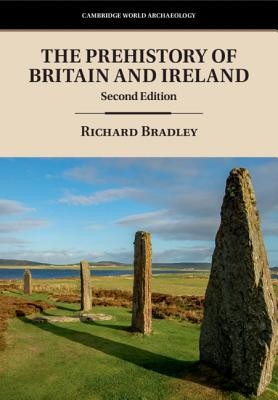
- We will send in 10–14 business days.
- Author: Richard Bradley
- Publisher: Cambridge University Press
- ISBN-10: 1108412475
- ISBN-13: 9781108412476
- Format: 21.1 x 25.2 x 1.8 cm, softcover
- Language: English
- SAVE -10% with code: EXTRA
Reviews
Description
Sited at the furthest limits of the Neolithic revolution and standing at the confluence of the two great sea routes of prehistory, Britain and Ireland are distinct from continental Europe for much of the prehistoric sequence. In this landmark study, Richard Bradley offers an interpretation of the unique archaeological record of these islands. Highlighting the achievements of its inhabitants, Bradley surveys the entire archaeological sequence over a 5,000 year period, from the last hunter-gatherers and the adoption of agriculture in the Neolithic period, to the discovery of Britain and Ireland by travellers from the Mediterranean during the later pre-Roman Iron Age. His study places special emphasis on landscapes, settlements, monuments, and ritual practices. This edition has been thoroughly revised and updated. The text takes account of recent developments in archaeological science, such as isotopic analyses of human and animal bone, recovery of ancient DNA, and more subtle and precise methods of radiocarbon dating.
EXTRA 10 % discount with code: EXTRA
The promotion ends in 20d.08:31:42
The discount code is valid when purchasing from 10 €. Discounts do not stack.
- Author: Richard Bradley
- Publisher: Cambridge University Press
- ISBN-10: 1108412475
- ISBN-13: 9781108412476
- Format: 21.1 x 25.2 x 1.8 cm, softcover
- Language: English English
Sited at the furthest limits of the Neolithic revolution and standing at the confluence of the two great sea routes of prehistory, Britain and Ireland are distinct from continental Europe for much of the prehistoric sequence. In this landmark study, Richard Bradley offers an interpretation of the unique archaeological record of these islands. Highlighting the achievements of its inhabitants, Bradley surveys the entire archaeological sequence over a 5,000 year period, from the last hunter-gatherers and the adoption of agriculture in the Neolithic period, to the discovery of Britain and Ireland by travellers from the Mediterranean during the later pre-Roman Iron Age. His study places special emphasis on landscapes, settlements, monuments, and ritual practices. This edition has been thoroughly revised and updated. The text takes account of recent developments in archaeological science, such as isotopic analyses of human and animal bone, recovery of ancient DNA, and more subtle and precise methods of radiocarbon dating.


Reviews